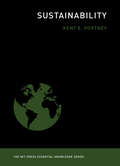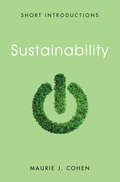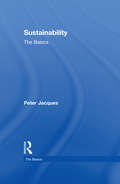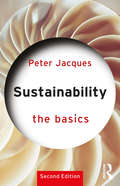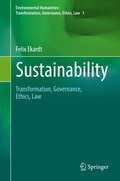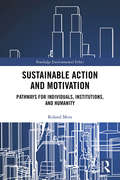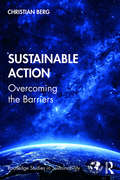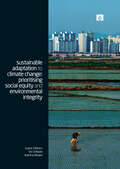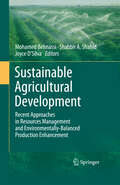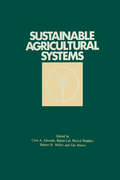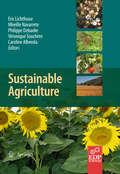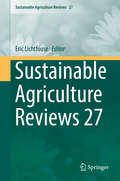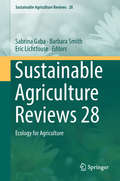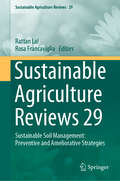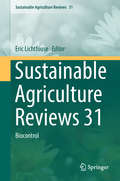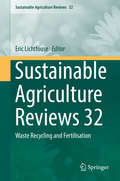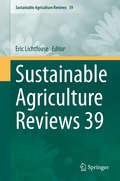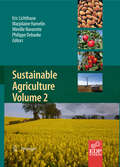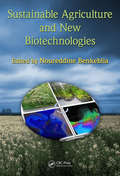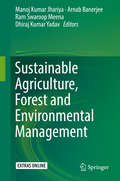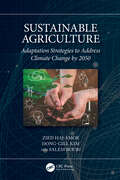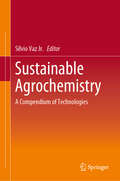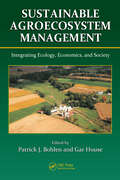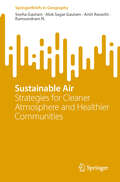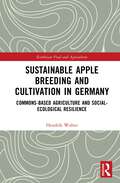- Table View
- List View
Sustainability: Creating The Green Metropolis (The MIT Press Essential Knowledge series)
by Kent E. PortneyA concise and accessible examination of sustainability in a range of contemporary contexts, from economic development to government policy.The word “sustainability” has been connected to everything from a certain kind of economic development to corporate promises about improved supply sourcing. But despite the apparent ubiquity of the term, the concept of sustainability has come to mean a number of specific things. In this accessible guide to the meanings of sustainability, Kent Portney describes the evolution of the idea and examines its application in a variety of contemporary contexts—from economic growth and consumption to government policy and urban planning.Portney takes as his starting point the 1987 definition by the World Commission on Environment and Development of sustainability as economic development activity that “meets the needs of the present without compromising the ability of future generations to meet their own needs.” At its heart, Portney explains, sustainability focuses on the use and depletion of natural resources. It is not the same as environmental protection or natural resource conservation; it is more about finding some sort of steady state so that the earth can support both human population and economic growth. Portney looks at political opposition to the promotion of sustainability, which usually questions the need for sustainability or calls its costs unacceptable; collective and individual consumption of material goods and resources and to what extent they must be curtailed to achieve sustainability; the role of the private sector, and the co-opting of sustainability by corporations; government policy on sustainability at the international, national, and subnational levels; and how cities could become models for sustainability action.
Sustainability: Prospects For Sustainability In The New Economy (Short Introductions)
by Maurie J. CohenSustainability is one of the buzzwords of our times and a key imperative for economic growth, technological development, social equity, and environmental quality. But what does it really mean and how is it being implemented around the world? In this clear-eyed book, Maurie Cohen introduces students to the concept of sustainability, tracing its history and application from local land-use practices, construction techniques and reorientation of business models to national and global institutions seeking to foster sustainable practices. Examining sustainable development in scientific, technological, social and political terms, he shows that it remains an elusive concept and evidence of its unambiguous achievements can be difficult to ascertain. Moreover, developed and developing countries have formulated divergent agendas to engage the notion of sustainability, further complicating its application and progress across the world. Innovative and readily accessible to students from a range of disciplines, this primer takes us on a journey to show that sustainability is as much about unchartered waters as it is about formulating answers to urgent global issues.
Sustainability: The Basics (The Basics)
by Peter JacquesSustainability is concerned with the issues around the ongoing and mutual preservation of both society and the environment. It is a widely used term and supposed goal for many governments but it is also easily misunderstood. Sustainability: The Basics offers an accessible and interdisciplinary introduction to the concept, and discusses key questions such as: How do we decide who or what should be sustained? How can we ensure that the world’s resources are distributed fairly? What lessons can we learn from the collapse of previous civilizations? Sustainability studies is in a position to ask some of the most interesting questions about human purpose, identity, modernity, ethics, and the nature of "progress". This book is an ideal starting point for anyone who wants to know more about we can ‘hold up’ civilization, humanity, and the world we live in.
Sustainability: The Basics (The Basics)
by Peter JacquesSustainability is a pressing concern for people and governments around the world, but it is also an essentially contested concept that requires an understanding of the stakes, trade-offs, and complex politics at play. Sustainability: The Basics offers an accessible and interdisciplinary introduction to the concept, and discusses key questions such as: What are the core principles of sustainability? What are the key ethical considerations for questions of sustainability? How do we measure sustainability? What are the critical obstacles to achieving global sustainability? What happens when societies fail to observe principles of sustainability? Fully updated in its second edition, Sustainability: The Basics now includes coverage of the Sustainable Development Goals, a global range of case studies and explores the complex social dynamics of Earth system changes that affect our critical life supports. The second edition also proposes a new, "sustainable humanism" that animates much of our work to make a better, more humane world. As the world reels from the effects of the Covid-19 pandemic, this book is an ideal starting point for anyone who wants to know more about what we need to do to sustain civilization, humanity, and the world we live in.
Sustainability: Transformation, Governance, Ethics, Law (Environmental Humanities: Transformation, Governance, Ethics, Law)
by Felix EkardtThis book proposes a holistic transdisciplinary approach to sustainability as a subject of social sciences. At the same time, this approach shows new ways, as perspectives of philosophy, political science, law, economics, sociology, cultural studies and others are here no longer regarded separately. Instead, integrated perspectives on the key issues are carved out: Perspectives on conditions of transformation to sustainability, on key instruments and the normative questions. This allows for a concise answer to urgent and controversial questions such as the following: Is the EU an environmental pioneer? Is it possible to achieve sustainability by purely technical means? If not: will that mean to end of the growth society? How to deal with the follow-up problems? How will societal change be successful? Are political power and capitalism the main barriers to sustainability? What is the role of emotions and conceptions of normality in the transformation process? To which degree are rebound and shifting effects the reason why sustainability politics fail? How much climate protection can be claimed ethically and legally e.g. on grounds of human rights? And what is freedom? Despite all rhetoric, the weak transition in energy, climate, agriculture and conservation serves as key example in this book. It is shown how the Paris Agreement is weak with regard to details and at the same time overrules the growth society by means of a radical 1,5-1,8 degrees temperature limit. It is shown how emissions trading must – and can – be reformed radically. It is shown why CSR, education, cooperation and happiness research are overrated. And we will see what an integrated politics on climate, biodiversity, nitrogen and soil might look like.
Sustainable Action and Motivation: Pathways for Individuals, Institutions and Humanity (Routledge Environmental Ethics)
by Roland MeesSustainable Action and Motivation proposes individual competencies and institutional policies that can help overcome the motivational hurdles that hamper sustainable action. Following the Paris Agreement of 2015 and the UN Sustainable Development Goals, the political momentum urgently to begin the drastic reduction of greenhouse gas emissions has increased significantly. Affluent, high-income OECD countries are expected to take the lead in the global transition to a low carbon society. Given this, we need a better understanding of the motivational problems that people in affluent countries face with acting sustainably. This book investigates the above questions by analysing three fundamentally different perspectives: individuals and their motivation to act sustainably; institutions who take responsibility for issuing policies that steer us towards taking sustainable action; and humanity, each individual member of which ought to understand his or her non-sustainable behaviour in relation to the continued existence of the collective of human beings. Using theories from empirical psychology and a phenomenological approach to the research, this book will be of great interest to students and scholars of practical philosophy, psychology of motivation and environmental psychology, as well as policymakers looking for ways to implement effective policies that encourage pro-environmental behaviour.
Sustainable Action: Overcoming the Barriers (Routledge Studies in Sustainability)
by Christian BergIn this timely exploration of sustainable actions, Christian Berg unpacks the complexity in understanding the barriers we face in moving towards a sustainable future, providing solution perspectives for every level, from individuals to governments and supra-national organizations offering a lucid vision of a long-term and achievable goal for sustainability. While the 2030 Agenda has already set ambitious targets for humanity, it offers little guidance for concrete actions. Although much is already being done, progress seems slow and some actions aiming at sustainability may be counterproductive. Different disciplines, societal actors, governmental departments and NGOs attribute the slow progress to a number of different causes, from the corruption of politicians to the wrong incentive structures. Sustainable Action surveys all the fields involved in sustainability to provide action principles which speak to actors of different kinds, not just those professionally mandated with such changes. It offers a road map to all those who might not constantly think about systems change but who are concerned and want to contribute to a sustainable future in a meaningful way. This book will be of great interest to students and scholars of sustainability issues, as well as those looking for a framework for how to change their systems at work to impact the quadruple bottom line: environment, economy, society, and future generations.
Sustainable Adaptation to Climate Change: Prioritising Social Equity and Environmental Integrity
by Katrina Brown Eriksen SiriThis book sets out how to ensure that adaptation efforts are socially and environmentally sustainable, contributing to poverty reduction as well as confronting the processes driving vulnerability. Over $100bn a year is pledged to help finance adaptation projects via the The Climate Adaptation Fund. These projects and their funding played a central role in the latest climate talks in Cancun, Mexico, ensuring that adaptation to climate change will be an international priority over the next few decades. Many existing adaptation projects are however, not environmentally or socially sustainable. Adaptation projects that focus on reducing specific climate sensitivities can, even if bringing benefits, adversely affect vulnerable groups and create social inequity, or even unintentionally undermine environmental integrity. Sustainable Adaptation to Climate Change examines how adaptation to climate change (types of measures, policy frameworks, and local household strategies) interacts with social and environmental sustainability. A mixture of conceptual and case study-based papers draw on research from Europe, Asia and Africa. It will be of interest to all researchers and policymakers in climate change adaptation and development.
Sustainable Agricultural Development
by Shabbir A. Shahid Mohamed Behnassi Joyce D'SilvaDue to many challenges (i.e. climate change, energy, water and land shortage, high demands on food, land grabbing, etc.), agriculture production potential is expected to be seriously affected; thus, increasing food insecurity and hunger in many already affected regions (especially in Africa). In this context, sustainable agriculture is highly recommended as an eco-system approach where soil, water, plants, environment and living organisms live in harmony. Innovative technologies and research should be developed to ensure sustainable agriculture and productivity using modern irrigation systems, improved varieties, improved soil quality, etc. In the meantime, the preservation of natural environment should be based on resource conservation technologies and best management practices. Sustainable Agricultural Development, not only raises the serious ethical and social issues underlying these huge environmental problems, but also aims at presenting successful experiences from all over the world in relation with sustainable farming, sustainable management of water and land resources, and innovative processes in livestock production. It also aims at providing inputs to decision making processes and encouraging the transfer of relevant know-how, technologies and expertise to different countries where similar agro-climatic conditions may exist; thus saving precious resources and promoting sustainable agricultural development as a relevant approach to tackle the food security challenge. Finally, this book focuses on the paradigmatic and policy dimensions and call for an innovative approach by analyzing the key themes in a complex and interrelated manner.
Sustainable Agricultural Systems
by Clive A. EdwardsA unique look at how the adoption of sustainable farming methods is being pursued throughout the world. This comprehensive book provides clear insight into research and education needs and the many points of view that come to bear on the issue of sustainability. Essential for agricultural leaders in research, education, conservation, policy making, and anyone else interested in creating an economically and environmentally sustainable agriculture worldwide.
Sustainable Agriculture
by Eric Lichtfouse Mireille Navarrete Philippe Debaeke Caroline Alberola Souchere VéroniqueSustainability rests on the principle that we must meet the needs of the present without compromising the ability of future generations to meet their own needs. Starving people in poor nations, obesity in rich nations, increasing food prices, on-going climate changes, increasing fuel and transportation costs, flaws of the global market, worldwide pesticide pollution, pest adaptation and resistance, loss of soil fertility and organic carbon, soil erosion, decreasing biodiversity, desertification, and so on. Despite unprecedented advances in sciences allowing to visit planets and disclose subatomic particles, serious terrestrial issues about food show clearly that conventional agriculture is not suited any longer to feed humans and to preserve ecosystems. Sustainable agriculture is an alternative for solving fundamental and applied issues related to food production in an ecological way. While conventional agriculture is driven almost solely by productivity and profit, sustainable agriculture integrates biological, chemical, physical, ecological, economic and social sciences in a comprehensive way to develop new farming practices that are safe and do not degrade our environment. In that respect, sustainable agriculture is not a classical and narrow science. Instead of solving problems using the classical painkiller approach that treats only negative impacts, sustainable agriculture treats problem sources. As most actual society issues are now intertwined, global, and fast-developing, sustainable agriculture will bring solutions to build a safer world. This book gathers review articles that analyze current agricultural issues and knowledge, then propose alternative solutions. It will therefore help all scientists, decision-makers, professors, farmers and politicians who wish to build a safe agriculture, energy and food system for future generations.
Sustainable Agriculture Reviews 27 (Sustainable Agriculture Reviews #27)
by Eric LichtfouseThis book deals with a rapidly growing field aiming at producing food and energy in a sustainable way for humans and their children. It is a discipline that addresses current issues: climate change, increasing food and fuel prices, poor-nation starvation, rich-nation obesity, water pollution, soil erosion, fertility loss, pest control and biodiversity depletion. This series gathers review articles that analyze current agricultural issues and knowledge, then proposes alternative solutions.
Sustainable Agriculture Reviews 28: Ecology For Agriculture (Sustainable Agriculture Reviews #28)
by Barbara Smith Eric Lichtfouse Sabrina GabaThis book presents ecological principles and applications of managing biodiversity in agriculture to decrease pesticide use and produce safe food. Major topics include ecosystem services biological pest control, conservation agriculture, drought stress, and soil biodiversity, carbon and fertilisation.
Sustainable Agriculture Reviews 29: Sustainable Soil Management: Preventive and Ameliorative Strategies (Sustainable Agriculture Reviews #29)
by Rattan Lal Rosa FrancavigliaThis book addresses the threats that hamper the achievement of sustainable soil management: soil erosion by water and wind, soil organic carbon loss, nutrient imbalance, salinization, contamination, acidification, loss of soil biodiversity, surface sealing, compaction and water logging. The specific focus is on preventive and ameliorative strategies for sustainable soil management.
Sustainable Agriculture Reviews 31: Biocontrol (Sustainable Agriculture Reviews #31)
by Eric LichtfouseThis book presents advanced ecological techniques for crop cultivation and the chapters are arranged into four sections, namely general aspects, weeds, fungi, worms and microbes. Biocontrol is an ecological method of controlling pests such as insects, mites, weeds and plant diseases using other organisms. This practice has been used for centuries. Biocontrol relies on predation, parasitism, herbivory, or other natural mechanisms. Natural enemies of insect pests, also known as biological control agents, include predators, parasitoids, pathogens, and competitors.
Sustainable Agriculture Reviews 32: Waste Recycling and Fertilisation (Sustainable Agriculture Reviews #32)
by Eric LichtfouseThis book summarise advanced knowledge and methods to recycle waste and fertilise soils in agriculture. In the near future, waste recycling will no longer be an option because natural resources become rare and costly, urbanisation is blooming and population is growing. In theory, most waste could be recycled. In practice, most waste is wasted. Remarkable aspects include the concepts of waste hierarchy eco-houses in smart cities, microbes and fungi for plant nutrition, and benefits of legume cultivation, biochar application and agropastoralism.
Sustainable Agriculture Reviews 39 (Sustainable Agriculture Reviews #39)
by Eric LichtfouseThis book reviews recent research advances in sustainable agriculture, with focus on crop production, biodiversity and biofuels in Africa and Asia.
Sustainable Agriculture Volume 2
by Eric Lichtfouse Marjolaine Hamelin Mireille Navarrete Philippe DebaekeThis book gathers review articles that analyze current agricultural issues and knowledge, then propose alternative solutions. It will therefore help all scientists, decision-makers, professors, farmers and politicians who wish to build a safe agriculture, energy and food system for future generations.
Sustainable Agriculture and New Biotechnologies
by Noureddine BenkebliaTaking a broad and innovative informational approach, Sustainable Agriculture and New Biotechnologies is the first book to apply omic technologies to address issues related to understanding and improving agricultural sustainability in the food production process. The transformation from industrial to sustainable agriculture is discussed within the
Sustainable Agriculture, Forest and Environmental Management
by Ram Swaroop Meena Manoj Kumar Jhariya Arnab Banerjee Dhiraj Kumar YadavThe recent technologies for sustainable development and maintaining ecological integrity in the field of agriculture, forestry and environmental management for the green future. Describes the recent technologies and issues to generate awareness among the global scientific community towards sustainable development.Covers various eco-friendly approaches for successful management of soil, water, forest, agriculture, and other natural resources. Addresses the policy issues promoting conservation, protection and management of various natural resources. Presents the issues of climate change and sustainable strategies to combat such a mega event. The existence of life on the earth primarily depends upon the agriculture, forest and environment. The changing climate is imposing the multifaceted challenges in front of human civilization. The agroecosystem management practices and technologies leads to higher productivity with destruction of agricultural, forest and environmental habitat leading to soil-water-air pollution. Food and Agriculture Organization (FAO) plays a key role in the promoting research and developmental activities in various sectors to achieve the sustainable development goals under 2030 agenda. Gradual growth of science and technology has imposed a significant pressure on the different ecosystem. In this context, approaches such as sustainable agriculture, forestry and eco-friendly technologies need to be address across the world. Keeping view of these facts this book underlines scientific chapters dealing with the issues with proper explanation, and accompanied by illustrative diagrams, tables, database as required. The editors have tried to provide a brief scenario about the current issues related to the agriculture, forestry and environment. Therefore, the book would be a very useful resource for academicians, scientists, and policy makers of the related field.
Sustainable Agriculture: Adaptation Strategies to Address Climate Change by 2050
by Zied Haj-Amor Salem Bouri Dong-Gill KimEver-increasing population growth, combined with ongoing climate change signals that agriculture will face great challenges in ensuring global food security by 2050. Additionally, climate change-driven variations in mean sea level, wave conditions, storm surge, droughts, and river flows could have serious effects on agriculture and other sectors. Considering these factors and the extremely high value and necessity of agriculture worldwide, effective adaptation measures underpinned by reliable climate change impact assessments are essential to conserve soil and water resources and ensure food security. Sustainable Agriculture: Adaptation Strategies to Address Climate Change by 2050 provides a thorough examination of these issues, and presents in-depth analysis, practical case studies, and numerous examples of adaptation options throughout for various regions of the world.Features: Presents up-to-date, scientifically robust information on climate change projections in Europe, Asia, America, Africa, and Australia Provides pathways to sustainable agricultural options rather than just defining the climate change issue Includes case studies and practical examples throughout the world Presents a framework by which policymakers can begin implementing strategies for improving agricultural productivity
Sustainable Agrochemistry: A Compendium of Technologies
by Sílvio Vaz Jr.This book presents a broad range of technologies for sustainable agrochemistry, e.g. semiochemicals for pest management, nanotechnology for release of eco-friendly agrochemicals, and green chemistry principles for agriculture. It provides a concise introduction to sustainable agrochemistry for a professional audience, and highlights the main scientific and technological approaches that can be applied to modern agrochemistry. It also discusses various available technologies for reducing the negative impacts of agrochemicals on the environment and human health.
Sustainable Agroecosystem Management: Integrating Ecology, Economics, and Society
by Patrick J. Bohlen Gar HouseSustainable Agroecosystem Management: Integrating Ecology, Economics, and Society examines the challenges for developing integrated approaches to the management of agricultural ecosystems. Providing historical background of attempts to bridge the ecological and agricultural sciences, this book highlights recent efforts to integrate natural and social science perspectives. Through various case studies with global applications, the text explores practical innovative strategies, policies, and research needs for emphasizing whole system productivity, diversification of agricultural operations, and management of agricultural systems that sustain multiple functions including ecological integrity.
Sustainable Air: Strategies for Cleaner Atmosphere and Healthier Communities (SpringerBriefs in Geography)
by Amit Awasthi Sneha Gautam Alok Sagar Gautam Ramsundram N.This volume explores the critical intersection of environmental sustainability and public health by exploring innovative approaches to address air pollution. With the ever-increasing global population and urbanization, air quality degradation has become a pressing concern, directly impacting the well-being of individuals and the planet. This comprehensive work synthesizes the latest research findings, policy insights, and technological advancements to offer a holistic perspective on mitigating air pollution while fostering sustainable development. The book begins by establishing a firm understanding of the multifaceted nature of air pollution, from its sources and composition to its effects on human health and the environment. Drawing on interdisciplinary research, it examines the intricate links between air quality, climate change, and societal well-being. "Sustainable Air" then shifts its focus to practical strategies and solutions, presenting a range of innovative approaches for reducing emissions, promoting clean energy sources, and enhancing urban planning to create livable, resilient communities. Through case studies and real-world examples, the book highlights successful initiatives from around the world, demonstrating how communities can transition to cleaner and more sustainable air quality standards. It also addresses the critical role of policy frameworks and international cooperation in achieving long-term air quality goals. Moreover, the book underscores the importance of public awareness and engagement, emphasizing the power of informed citizenry in advocating for cleaner skies and healthier environments. "Sustainable Air: Strategies for Cleaner Skies and Healthier Communities" provides a roadmap for policymakers, urban planners, researchers, and concerned citizens to collaboratively work towards a future where clean air and sustainable living are not only attainable but also synonymous with human progress. By promoting a balanced and harmonious relationship between society and the environment, this book aspires to inspire meaningful change, ultimately leading to improved air quality and well-being for generations to come.
Sustainable Apple Breeding and Cultivation in Germany: Commons-Based Agriculture and Social-Ecological Resilience (Earthscan Food and Agriculture)
by Hendrik WolterApplying a socio-ecological framework, this book explores how the innovative approach of commons-based organic apple breeding can contribute to sustainability in agricultural and food systems more widely. As fruit breeding and cultivation systems are confronted with a range of sustainability challenges, there are calls for new and innovative breeding approaches beyond mainstream economic solutions that would mitigate these sustainability challenges. Apples, in particular, are facing serious environmental challenges, with the negative environmental impacts of modern conventional breeding and farming, loss of agrobiodiversity, low participation and diminishing diversity of market actors in the wake of privatization and economization trends result in a lack of resilience in current breeding and cultivation systems. Drawing on in-depth case study research on apple production in Germany, this book advances the innovative solution of commons-based apple breeding as a model for developing resilience in fruit breeding and cultivation. It analyzes this approach, comparing it with more conventional practices, and showcases which factors could inhibit the broad implementation of commons-based apple breeding and how they can be overcome to exploit its full potential. Contributing to the great ambition of finding sustainable solutions across all agricultural sectors, this book opens up new and interdisciplinary perspectives on fruit breeding and cultivation, which is a largely neglected issue in contemporary discussions on agriculture and food production. This book will be of great interest for students and scholars from the fields of sustainable food systems, sustainable agriculture, crop science, and resource management and in particular those that seek inspiration for innovative approaches rooted in sustainability research, social-ecological resilience, and the commons.
